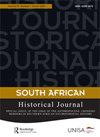南非反法西斯主义和纳粹外交部:反犹主义、反共主义和对第三帝国国际敌人的监视
IF 1
3区 历史学
Q1 HISTORY
引用次数: 1
摘要
本文对第三帝国外交部如何报道20世纪30年代南非联邦的反法西斯活动进行了新的分析。根据德国驻南非公使馆和德国官方代表撰写的信件、急件和报告,文章揭示并讨论了纳粹官员如何跟踪和应对南非的反法西斯活动。这篇文章展示了德国代表团如何看待反法西斯运动,并将其分析为全球反德情绪、犹太激进主义和“国际布尔什维克主义”的一部分。南非反法西斯主义也直接关注20世纪30年代南非和纳粹德国之间的官方双边关系。当德国抗议德国纳粹主义、国际法西斯主义和南非当地法西斯团体时,德国非常关注南非公众舆论。因此,这篇文章扩大了我们对南非在全球反法西斯和法西斯主义斗争中的地位的理解,并讨论了反法西斯主义被剥夺合法性的方式。此外,它还展示了德国俱乐部、办公室、船只和领事馆如何成为重要的抗议场所以及反法西斯活动和抵制的目标。本文章由计算机程序翻译,如有差异,请以英文原文为准。
South African Anti-Fascism and the Nazi Foreign Office: Antisemitism, Anti-communism and the Surveillance of the Third Reich’s International Enemies
ABSTRACT This article offers a new analysis of how the Third Reich’s Foreign Office reported on anti-fascist activities in the Union of South Africa during the 1930s. Based on letters, dispatches and reports written by the German legation and official German representatives in South Africa, the article reveals and discusses how Nazi officials followed and reacted to anti-fascist activity in South Africa. The article demonstrates how the German legation perceived anti-fascist movements and analysed them as a part of a rising global anti-German sentiment, Jewish activism, and ‘international bolshevism’. South African anti-fascism reveals itself also as a direct concern for the official bilateral relations between South Africa and Nazi Germany during the 1930s. Germany was intensely concerned with South African public opinion when it came to protests against German Nazism, international fascism and local fascist groups in South Africa. The article thus offers to expand our understanding of South Africa’s place in the global struggle between anti-fascism and fascism and discusses the ways in which anti-fascism was delegitimised. Furthermore, it shows how German clubs, offices, ships and consulates became important sites of protest and targets of anti-fascist activities and boycotts.
求助全文
通过发布文献求助,成功后即可免费获取论文全文。
去求助
来源期刊

South African Historical Journal
Multiple-
CiteScore
0.70
自引率
0.00%
发文量
37
期刊介绍:
Over the past 40 years, the South African Historical Journal has become renowned and internationally regarded as a premier history journal published in South Africa, promoting significant historical scholarship on the country as well as the southern African region. The journal, which is linked to the Southern African Historical Society, has provided a high-quality medium for original thinking about South African history and has thus shaped - and continues to contribute towards defining - the historiography of the region.
 求助内容:
求助内容: 应助结果提醒方式:
应助结果提醒方式:


